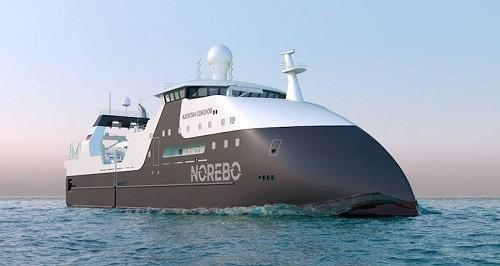
The pandemic's impact on supply chains and price levels has raised important questions about sustainability and waste in the fishing industry. However, despite the challenges of the past eighteen months, some businesses have continued to prioritise a conservationist approach. Norebo, the Russian fishing giant whose fleet supplies household names like McDonald's and Birds Eye, started in 1997 in Murmansk, where it is still based today. Vitaly Orlov founded it, an entrepreneur driven by his desire to improve marine sustainability and bring employment and prosperity to Russian communities.
"To build a fishing industry, Russia can be proud of means, first and foremost, protecting our fisheries. Cod, haddock, pollock – these are some of the treasures of the seas and an essential part of the planet's food security. To continue enjoying these riches for years to come, we need to preserve marine ecosystems, including sometimes fragile sea beds."
For Orlov, putting environmental stewardship at the heart of Russia's fishing industry has always been a necessity. To protect fish stocks, Norebo has kitted out its vessels with state-of-the-art technology to maximise the efficiency of its catch, leading the company to minimise wasteful fishing practices and maximise the utilisation of each fish. Orlov has made sure that his business is an active member of the Marine Stewardship Council (MSC). This means that its fishing quotas as part of national catch correspond with the scientific advice on what is safe to fish in a given area.
Norebo is in tune with the economic and social responsibilities required of a large employer. The company enforces an 18+ policy on its vessels, follows internationally recognised safety standards, and pays its staff considerably more than the national average, making Norebo the jewel in Murmansk's crown, where it is both the biggest employer and the largest taxpayer. Norebo carefully considers its environmental, social, and economic impact, which forms its approach to business. For Norebo, this is the key to organisational success and sustainable development.
Sergei Sennikov, Norebo's Chief Sustainability Officer, is proud that the company operates on the same employment standards as merchant fleets, touring schools across Russia to advertise the security and career opportunities in the industry. Norebo has built a strong relationship with the World Wildlife Fund (WWF), supporting its efforts on marine conservation, focusing on vulnerable marine habitats in Arctic waters. Sennikov notes that the company is also driving the debate on sustainable consumption, a necessity for maintaining biodiversity and a thriving fishing industry. The Fund's Russian arm, WWF Russia, has called for innovative technology to maximise catch efficiency.
Norebo and WWF Russia are also working closely together to secure the conversation of Russia's and Norway's marine reserves. In November 2016, they collaborated with scientific advisors to map out the vulnerable ecosystems in the Barents and Norwegian seas, ensuring that fishing in both these territories proceeds at a sustainable rate.
Evgeniy Shamrai, former Deputy Director of the Polar Research Institute of Marine Fisheries and Oceanography (PINRO), praised the ongoing agreement, noting that it has enabled "a transition to a higher quality level, another step in the development of an ecosystem approach to fisheries management". COVID-19's impact on global supply chains has undoubtedly been a stumbling block. Restaurants rely on just-in-time delivery, and consumers want to eat fresh, responsibly sourced fish.
The Russian government recognises these challenges and is making diplomatic efforts to restore supply chains to their pre-pandemic pomp. They are aware that companies like Norebo are both the backbone of the national fishing industry and the lifeblood of numerous communities.
While global trade is still recovering from the shock of 2020, major industry players will continue to drive the sustainability agenda and protect employment opportunities across their territories. Marine biodiversity has a bright future if other companies would only follow suit.









